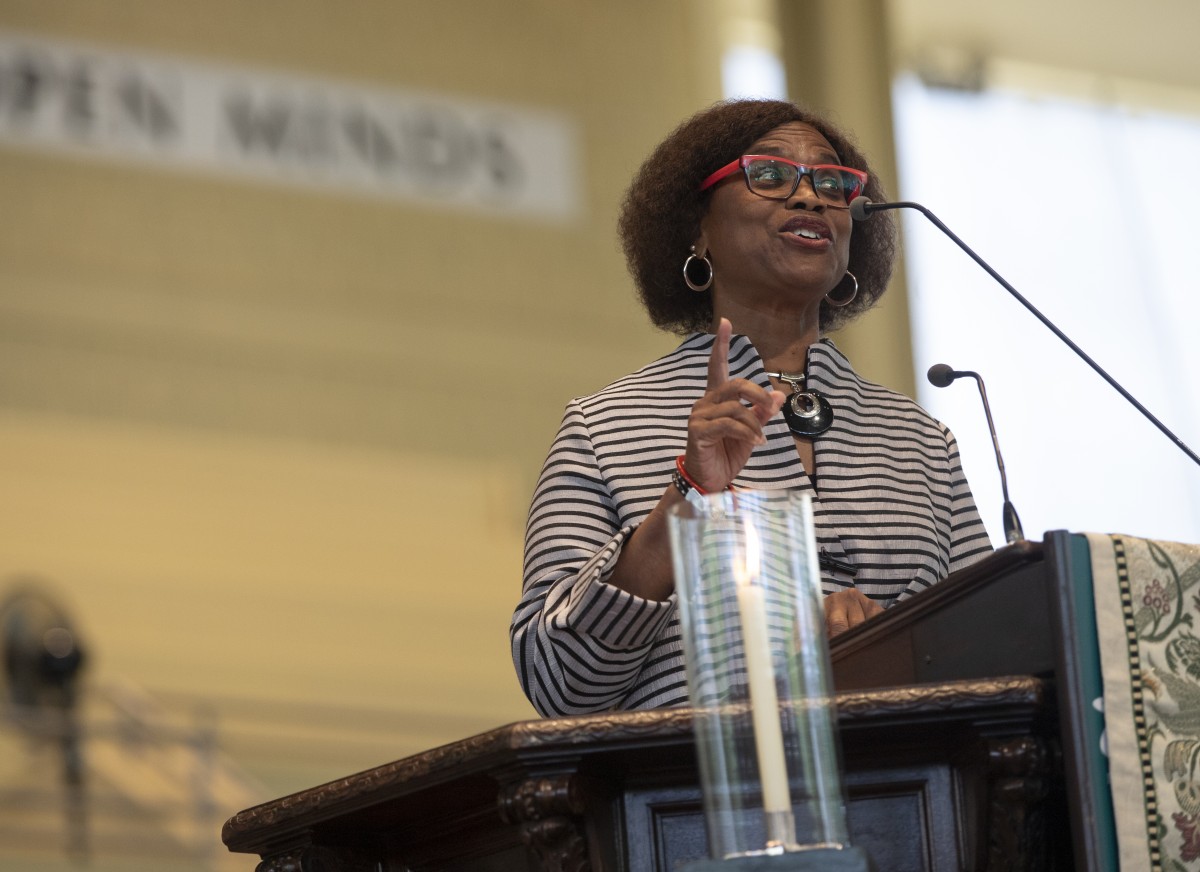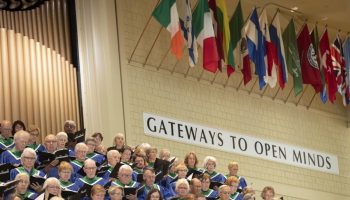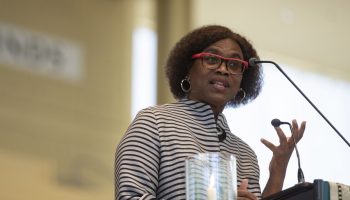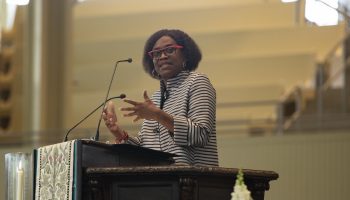“Today is Wednesday, hump day. We climb the hill through a tough week, and the rest of the week we get closer to the weekend,” said the Rev. Irene Monroe at the 9:15 a.m. Wed., Aug. 15, morning worship service.
Her sermon title was “The Act of Going Away Closer,” and the Scripture text was Matthew 6:9-13, the Lord’s Prayer.
“For me, Thursday was one day closer for those of us who live for the weekend, and I like to slide into Friday,” she said.
In explaining how she developed the title to her sermon, she said, “If you knew me in my dating years, I was a magnet for crazy. In the lesbian culture, after three dates you cohabitate.”
She said that she was not that committed; she did not want to give someone the key to her apartment.
“I want you to be in my life, I want you but not all that, if you know what I mean,” she said.
Going away closer in the context of Chautauqua means that we are still ambivalent about diversity, we are still trying to figure it out, she told the congregation.
“One person of color is always OK, but two might create a trend,” Monroe said, describing the nature of ambivalence. “We might have some in the neighborhood, but not too many.”
She went on Yelp! to see what the comments said about Chautauqua. Out of five stars, Chautauqua got 4.5 — which is not too bad, she said. One person called Chautauqua a “summer camp for intellectuals and former hippies into lifelong learning.” Another noted there are “activities for the whole family,” and one wished that “bike riders would remember that there are more walkers around on Sunday.”
The one negative review was “It is too expensive. It is beautiful and well-kept, but us locals can’t afford it.”
“These gates are designed to keep those voices out,” Monroe said. “Chautauqua has to be honest with itself — do you really want diversity, or are you ambivalent about it? I think you are ambivalent.”
She asked if Chautauqua was seeking diversity because it was politically correct, or if Chautauquans are people who want justice in this world but “not in your own space.”
“Why do you seek diversity now?” she said. “There is a moral imperative that you cannot be as white as you are.”
Monroe noted that Chautauqua has always had people of color as entertainers and lecturers, but one person told her this was a place where “the rich go to talk about the plight of the poor.”
“Your lecture platform could rival the United Nations, but there is a wall into the community,” she said. “You are in that ‘go away’ place, and I wondered, ‘Is it just me, or did I come at a bad time?’ ”
Religion is one of the pillars of Chautauqua, but worship here is “no different from 11 a.m. on Sunday morning in the rest of the country,” she said.
“You are replicating your DNA in how to worship God,” Monroe said.
It is an uphill battle while we still have segregated worship space in this country. There is also competition for Chautauqua in Provincetown and Martha’s Vineyard.
“If I was not here, my spouse and I would be in P-town at Carnival,” Monroe said. “There are so many black folks on Martha’s Vineyard in August, I have dubbed it ‘Black History Month on the Vineyard.’ ”
Since the Obamas began vacationing there, people will not give up a sighting of them on the Vineyard to go anywhere else on vacation.
“They won’t come here because they prefer a sighting, and I am being blinded (by your whiteness),” Monroe said.
You are God’s “frozen chosen,” she said. “Claim it, affirm it, don’t keep it.”
She said she always thought that “God’s frozen chosen” had to do with the weather, but in seminary, she learned about high and low church, about the frozen chosen and “Bapticostals who call on Jesus.”
“I am concerned about you,” she told the congregation. “You are overly traditional in your religious training, your white privilege and your class traditions.”
She asked how she could say her next statement politely.
“You are not healthy,” Monroe said, “you are toxic, and if you have a faith bent on justice, you need to look at yourselves and the world.”
One reason she chose the Lord’s Prayer for the Scripture is “it allows all of us, no matter our walk of life, to have common words that we utter as children of God.”
“It is part of our common humanity, and saying it made me feel like a part of this community,” she said.
Monroe told the congregation that we can’t say the Lord’s Prayer if our religion has no room for others.
“We can’t say ‘Our Father in heaven’ if only what happens here matters,” she said. “We can’t say ‘thy will be done’ if we resent the reality of the world. We can’t say ‘give us our daily bread’ if we don’t expend honest effort for it and we ignore the needs of others.”
She continued: “We can’t say ‘forgive our trespasses’ if we carry a grudge. We can’t say ‘keep us out of temptation’ if we put ourselves deliberately in situations of danger, what I call ‘stuck on stupid.’ We can’t say ‘thine is the power’ if we fear what others will say about us. We can’t give God the glory if we seek it for ourselves. We can’t say forever if we are anxious about the moment.”
People can’t say Amen “unless we can say, cost what it may, this is my prayer,” she said.
It takes baby steps to get to diversity, Monroe said.
“You are in a hump place, and you need to get through the tough work,” she said. “How can you be less white, how can you not be the frozen chosen?”
Accept that you might want to be more diverse but “you might not be what you are capable of being,” she told the congregation. “Accept that, and it can be better for you and me.”
Tell the truth, she said.
“Tell the truth, and say, ‘I am ambivalent.’ You will make this a more delightful place,” Monroe said. “Just say, ‘I am in an ambivalent place.’ Amen.”
The Rev. Natalie Hansen presided. Bud Brown, a retired librarian and former co-host of the Baptist House, read the Scripture. The Motet Choir, under the direction of Jared Jacobsen, organist and coordinator of worship and sacred music, sang “Diverse in Culture, Nation, Race,” words by Ruth Duck set to a tune by Thomas Tallis. The Samuel M. and Mary E. Hazlett Memorial Fund and the John William Tyrrell Endowment for Religion provide support for this week’s services.





